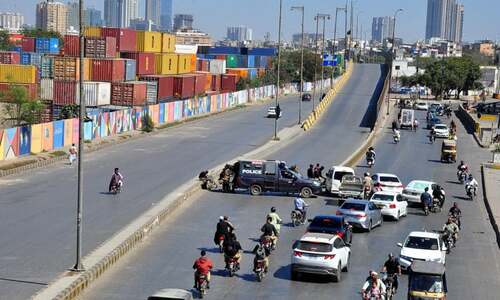KARACHI, Feb 9: The Sindh home minister’s recent threat to dislodge Afghan refugees from Sindh sounds idle as the federal government has already extended refugee status to 50,000 displaced Afghans in the province under a tripartite agreement signed by Pakistan, Afghanistan and the United Nations High Commissioner for Refugees (UNHCR).
In reply to a question posed by a fellow legislator during the Sindh assembly’s last session, Home Minister Dr Zulfiqar Mirza said that the refugee status of Afghans had expired.
His comments that the government machinery could be employed to send the Afghans back to their country if a resolution was passed by the assembly sounded odd to both the international body and the local law enforcers.
“The Afghans, who are staying in Karachi or in any other part of the country, enjoy refugee status under a tripartite agreement,” said a spokesman for the UNHCR.
“Pakistan’s interior ministry has issued them PoR (Proof of registration) cards to determine the exact number of such refugees. Sindh is home to some 50,000 Afghan refugees and most of them are staying in Karachi.”
Though the UNHCR spokesman did not comment on Sindh’s home minister’s claim, the official said that under the agreement signed by Pakistan, Afghanistan and the UNHCR, the Afghan refugees could not be forced to leave the country for repatriation unless they decided to do so voluntarily.
“There is an international law which defines the status of a refugee. The Afghan refugees in Pakistan are allowed to lead a simple and normal life without any threat and then move back to their country on their own,” added the UNHCR spokesman.
In 2006, the government decided to register the Afghan refugees who had poured into Pakistan in the early 1980s following the Russian invasion.
The then federal ministry of the frontier regions oversaw the registration process carried out by Nadra, while the government also took the UNHCR and the Afghan ministry for refugees and repatriation on board.
However, the fresh revelation of a provincial government approach to formulate a policy to get rid of the more than 1.5 million aliens staying mainly in Karachi is likely to prove ineffective in relation to Afghan nationals.
The law enforcers recognise that they are not supposed to treat the registered Afghans as aliens, neither have they the authority to challenge their status.
“In the recent past, the police rounded up some Afghan nationals in different parts of the city but released them after initial questioning when they proved their identity as registered refugees,” said a senior police official, who asked not to be named.
“The police have the authority to question any local resident on grounds of suspicion under a defined law, but the law enforcers don’t have the power to detain any Afghan on the grounds that he is not a national. The police can move only against unregistered Afghans, whose number is very small in Karachi.”
To make the process of Afghan refugees’ registration more effective, the government, in collaboration with the UNHCR, had launched an initiative more than a year ago for updating the records, including registering, updating, correcting and modifying the existing PoR cards, in selected areas of the country.
The government through Nadra, and in collaboration with the chief commissioner for Afghan refugees office, registered 2.19 million Afghans in 2006 and 2007 with the financial and technical support of the UNHCR.
Some 300,000 registered Afghans had returned home by July 2008 since the registration started and around 1.7 million registered Afghans still live in Pakistan.
However, the UNHCR firmly believes the remaining 1.7 million, including the 50,000 in Karachi, would move to their homeland only when they want to do so.
“Their main residential areas in Karachi are Sohrab Goth and the localities adjacent to it,” said the UNHCR spokesman. “They are free to live here, as their status is legitimate and one should not count them as aliens.”

































